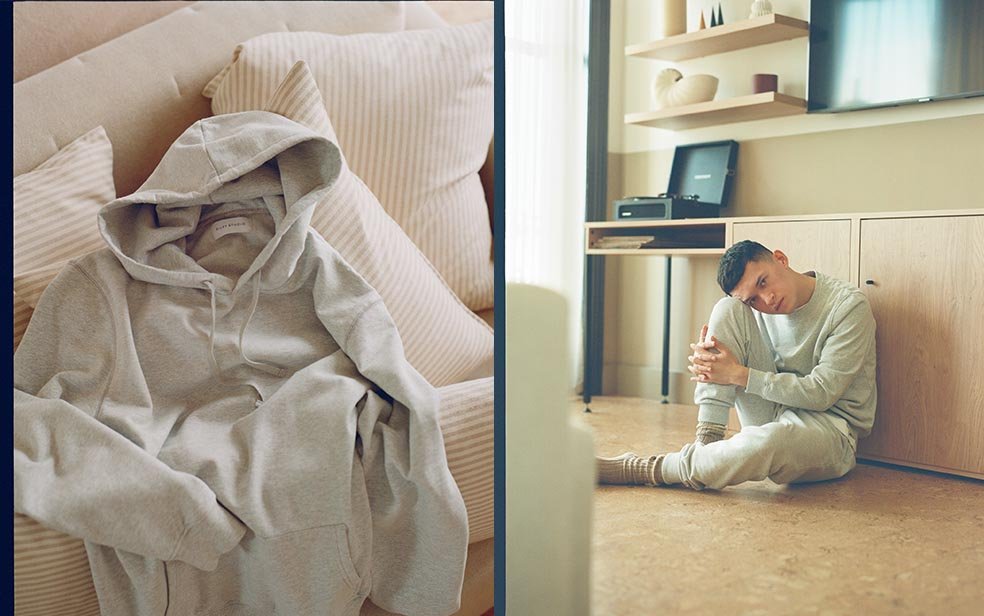An advocate for slow fashion, Riley Studio has long been a fan of Jordan Bunker and his outlook on consumerism.
We recently sat down with him at Port Hotel, Eastbourne to talk about his journey into slow fashion, what sustainability means to him and what he looks for when purchasing any new clothes.
Hi Jordan, it’s a pleasure speaking to you. Can you tell us a bit about yourself?
Hey Riley team, of course! So, I live in the Midlands in a small town outside of Leicester, but I do have one eye on Manchester in order to try something different. Work wise, I think I have finally settled on the job title of ‘Menswear Writer and Content Creator’ and while there are other elements, this is the succinct version. I’ve been within this space for the best part of a decade, starting as a person who used a blog as a way of writing about the subjects that interested me, to now being able to call it work.
You are an advocate for slow fashion, was there a particular lightbulb moment or has it been a gradual journey?
It is definitely a journey. There is so much to learn when it comes to the issues of the fashion industry, so to take it all in in one go would be quite the task. The more time I have spent in the menswear space and the various projects I have been involved in, the more my mindset has changed. I reckon the noise around how fashion is damaging the planet is much more prominent than say, five years ago, but there’s still a large percentage of people out there who don’t make that connection between clothes, climate change and the people who make them.
I would say my entry point into slow fashion came from an interest in reducing my own consumption and needing less in my life. The fortunate position I find myself in means that I am offered quite a lot of clothes through work. It gets to a point where you realise that it just becomes wasteful. Then when I couple this with what I have learnt about fast fashion and the various aspects to it - supply chain, garment workers and materials - you start to realise how much developed societies benefit from others, while subsequently damaging the planet and suppressing garment workers all across the world. I’ve certainly made mistakes, yet I think all of my experiences have helped mould the opinions I hold now.

Jordan wears our Recycled Cotton Classic Sweatshirt.
How would you describe your everyday uniform? Do you have core building blocks as part of your wardrobe?
Does the colour navy count as a building block? Along with navy, comfort is often prioritised, regardless if I am at home for the day or outside. Generally, my outfits will be slightly generous in fit that lean into straight and wide silhouettes, along with a touch of navy for good measure. As for footwear, it could be a white trainer or loafer. Something I feel I have developed since lockdowns have become less frequent is the pull towards a bold accessory. You might see me on my Instagram profile a bright blue hat or a colourful sock. I don’t think this would have even been a consideration beforehand.
Sustainability in the fashion industry has developed hugely in the past few years, yet it’s a word that means different things to different people. What does it mean to you?
While I am happy that the conversation is becoming more regular, I feel that the word sustainability is being diluted. It no longer has its same importance due to the frequency - and the misuse - of the word through greenwashing. I think it goes back to what I was saying earlier about the issues being so broad that to umbrella it under one term is difficult. “Sustainability” seems to be what the industry is favouring and what a customer is beginning to understand, but we should be careful it is not being used to mislead. For example, a product that is 50% organic cotton, 50% polyester, can you truly call that sustainable? I think clear regulatory lines need to be drawn, as allowing brands to use it wrongly could be more damaging in the long run.
How important are the fabrics and materials in your decision to purchase an item?
It is one of the first things I look at. If a product has some blend of plastic (or entirely made of plastic) then it adds a layer of thinking into whether I truly want something. For me I think about the micro plastics that come with washing the item, as well as end of life and how that item of clothing will be in landfill for an extremely long time. Items that use organic materials is great to see and hopefully we’ll see this being the norm. With recycled materials, for example polyester, I like the idea that it is being kept out of landfill and oceans, but we still have to consider how we use it.

Jordan wears our Recycled Cashmere Funnel Neck Sweater, Recycled Cotton Oversized Pocket T-Shirt and Recycled Cotton Track Pants.
What advice would you give to people who are trying to shop more consciously?
Slow down. Open up your wardrobe and really familiarise yourself with what you own. Consider what you wear and how often. Once you do this you can then properly question if you need to add an item to your wardrobe. If we can all reduce the amount we consume, we can make a big difference together.
What is your favourite piece of the Riley Studio collection?
Having become quite familiar with a few of items for our shoot together at Port Hotel in Eastbourne, I would say that the recycled cashmere funnel neck sweater was hard to take off. It’s extremely soft and definitely encourages a mid-afternoon nap.
Special thanks to:
Photographer: Ollie Ali
Location: Port Hotel, Eastbourne
For more inspiration head over to Jordan's instagram or read more from his blog jordanbunker.uk


Back to Our Journal